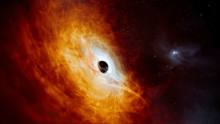Radio astronomy
Bubble-blowing dead stars could create ‘most violent phenomena in the universe’
Scientists have found new evidence linking fast radio bursts (FRBs)—brief, intense energy blasts that outshine entire galaxies—to magnetars, which are highly magnetic neutron stars.
Astronomers find what may be the brightest object
Astronomers have discovered what may be the brightest object in the universe, a quasar with a black hole at its heart growing so fast that it swallows the equivalent of a sun a day.
- Read more about Astronomers find what may be the brightest object
- Log in to post comments
8 billion-year-old radio signal reaches Earth
The burst, named FRB 20220610A, lasted less than a millisecond, but in that fraction of a moment, it released the equivalent of our sun’s energetic emissions over the course of 30 years
- Read more about 8 billion-year-old radio signal reaches Earth
- Log in to post comments
The Cosmos is thrumming with gravitational waves, astronomers find
On Wednesday evening, an international consortium of research collaborations revealed compelling evidence for the existence of a low-pitch hum of gravitational waves reverberating across the universe.
Astronomers reveal what ignites quasars
Astronomers said on April 26 that for the first time they have confirmed what ignites quasars, the brightest and most powerful objects in the universe, which put galaxies in their "death throes."
These celestial behemoths form when two galaxies smash into each other, the astronomers said, warning that this could be the Milky Way's fate in a few billion years.
- Read more about Astronomers reveal what ignites quasars
- Log in to post comments
Astronomers spot mysterious object unlike any seen before
Strange Milky Way object sends radio bursts a minute at a time
NASA Has Detected a Massive Thermonuclear Explosion in Space
NASA has detected a massive thermonuclear explosion in space. The culprit appears to be a distant pulsar, according to the space agency - the remains of a star that exploded into a supernova but was too small to form a black hole.
Scientists Uncovered Mysterious Radio Impulses from the Cosmos
Scientists unraveled the origin of one of the most mysterious phenomena in the universe, reports Nova TV. It's about fast radio bursts (FRBs), an intense radio wave, which lasts only milliseconds. Up to now, only 24 similar signals have been recorded, and a single one, referred to as FRB 121102, has repeated.
Could mysterious signals from distant galaxy be aliens?
Mysterious signals detected in a distant galaxy by astronomers working for Stephen Hawking’s project to find alien life have sparked a debate over whether they could be from UFOs.
The cosmic dance of three dead stars could break relativity
Imagine you’re an astronomer with bright ideas about the hidden laws of the cosmos. Like any good scientist, you craft an experiment to test your hypothesis.
Then comes bad news – there’s no way to carry it out, except maybe in a computer simulation. For cosmic objects are way too unwieldy for us to grow them in Petri dishes or smash them together as we do with subatomic particles.







